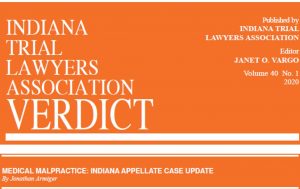Indiana Court of Appeals Upholds Icy Sidewalk Slip and Fall Jury Verdict Against Non-Property-Owning Grocery Store
As cold weather with the potential for snow and ice accumulations in store parking lots and on sidewalks approaches, the Indiana Court of Appeals’ recent decision in Pioneer Retail, LLC v. Jones is a reminder to businesses that despite not being an owner of the property, businesses can still be held liable for injuries to their invitees. In this case, the Indiana Court of Appeals upheld a significant jury verdict for a woman who suffered severe injuries in a fall on ice on a sidewalk outside a Wiseway Food grocery store in Crown Point, Indiana. Plaintiff Jane Jones (“Jones”) filed suit against Pioneer Retail, LLC (“Pioneer”), which owned and operated the Wiseway Food grocery store, the owner of the property where the Wiseway Food grocery store was located, a management company for the property, and a snow and ice removal contractor. Prior to trial, Pioneer filed a motion for summary judgment arguing it was entitled to judgment as a matter of law because it did not owe any duty of care to Jones. After conducting a hearing on the matter, the trial court denied Pioneer’s motion for summary judgment and the Court of Appeals denied its interlocutory appeal. The case proceeded to a jury trial and the jury returned a verdict in favor of Jones, with 25% fault apportioned to Pioneer and 75% fault apportioned to the other defendants.
Pioneer appealed and argued on appeal that the trial court erred by denying its motion for summary judgment. Pioneer argued it neither owned nor controlled the sidewalk where Jones fell. Pioneer argued the property owner was the exclusive owner of the sidewalk with ultimate responsibility for keeping it clear of snow and ice. Pioneer pointed to the fact that the property owner had contracted with a snow and ice removal contractor to clear snow and ice from the sidewalk.
Under Indiana law, to recover damages in a slip and fall negligence case, a plaintiff must show 1) the defendant owed a duty to the plaintiff, 2) the defendant breached that duty, and 3) the plaintiff’s injury was proximately caused by the defendant’s breach of duty. Landowners and possessors of land owe persons they invite onto their premises a duty to exercise reasonable care for their protection while they are on the premises. An inviter is subject to liability for physical harm caused to its invitees by a condition on land if it (a) knows or by the exercise of reasonable care would discover the condition, and should realize that it involves an unreasonable risk of harm to such invitees; (b) should expect that they will not discover or realize the danger, or will fail to protect themselves against it, and (c) fails to exercise reasonable care to protect them against the danger.
 Indiana Personal Injury Lawyer and Medical Malpractice Attorney Blog
Indiana Personal Injury Lawyer and Medical Malpractice Attorney Blog





















 Barsumian Armiger attorney Jonathan Armiger’s article examining recent Indiana medical malpractice cases was published in Volume 40, No 1 of the Indiana Trial Lawyers Association (ITLA) Verdict. The article is republished below with permission from ITLA.
Barsumian Armiger attorney Jonathan Armiger’s article examining recent Indiana medical malpractice cases was published in Volume 40, No 1 of the Indiana Trial Lawyers Association (ITLA) Verdict. The article is republished below with permission from ITLA.